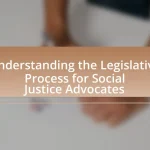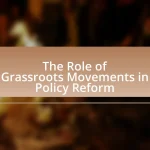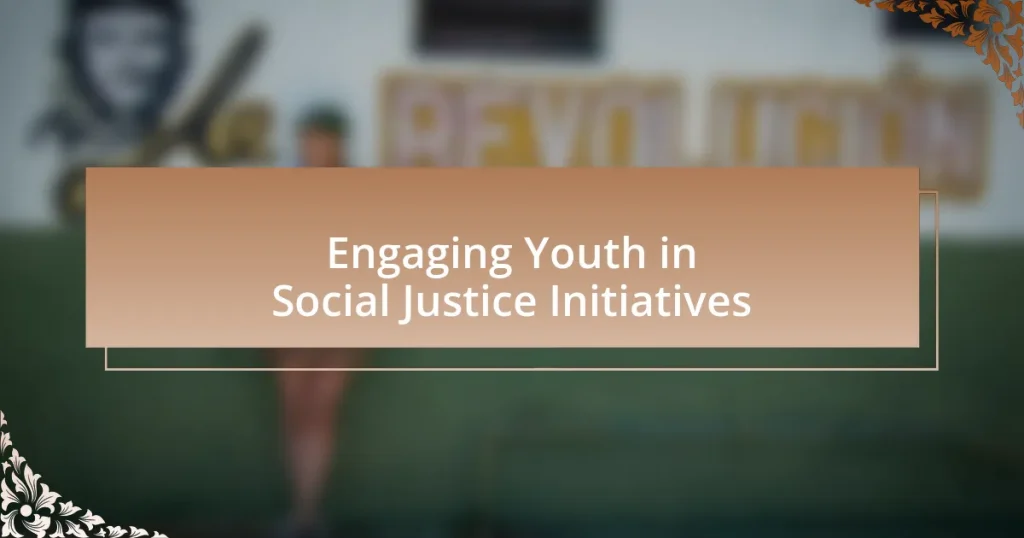Engaging youth in social justice initiatives involves actively involving young individuals in addressing societal inequalities and advocating for systemic change. The article explores the importance of youth engagement, highlighting how it empowers young people to influence societal change, develop critical skills, and enhance community resilience. It discusses the unique perspectives that youth bring to social justice issues, the challenges they face in participation, and the role of mentorship and local organizations in fostering engagement. Additionally, the article outlines effective strategies for organizations to involve youth, the potential impacts of youth-led initiatives, and practical steps for young individuals to get involved in social justice efforts.
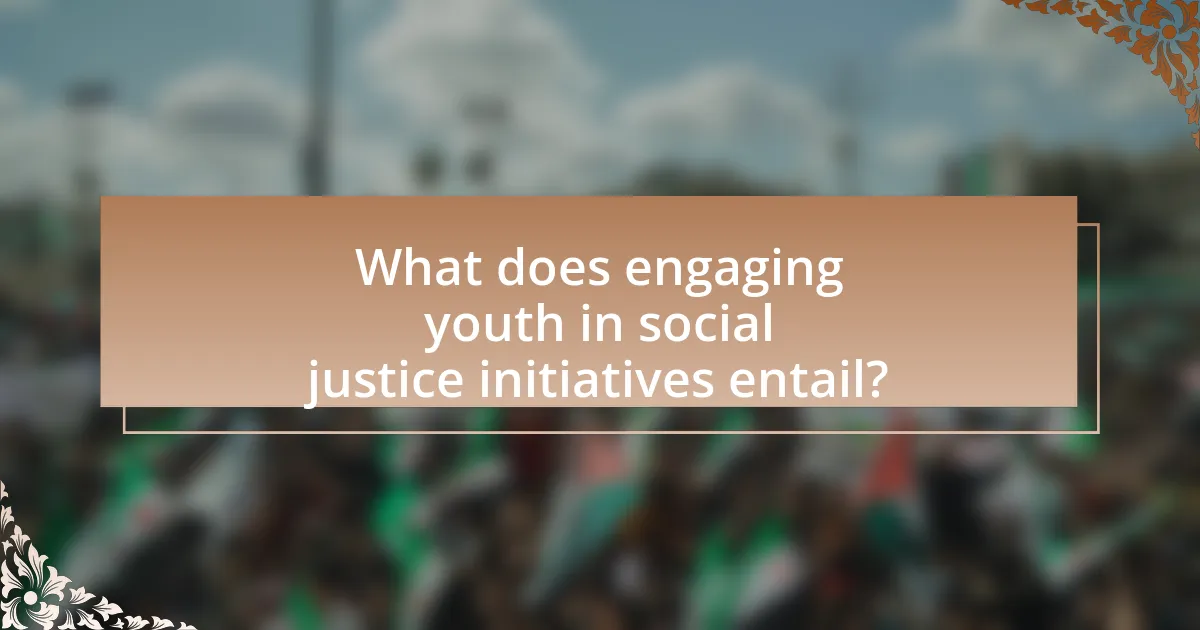
What does engaging youth in social justice initiatives entail?
Engaging youth in social justice initiatives entails actively involving young individuals in efforts aimed at addressing societal inequalities and advocating for systemic change. This engagement often includes education on social justice issues, opportunities for youth to participate in community organizing, and platforms for them to voice their opinions and influence decision-making processes. Research indicates that youth involvement in social justice initiatives fosters critical thinking, enhances civic engagement, and promotes leadership skills, which are essential for effective advocacy. For example, programs like the Youth Activism Project have demonstrated that when young people are empowered to take action, they can significantly impact their communities and drive social change.
Why is youth engagement important in social justice?
Youth engagement is crucial in social justice because it empowers young individuals to influence societal change and advocate for their rights. Engaging youth fosters a sense of ownership and responsibility towards social issues, enabling them to contribute fresh perspectives and innovative solutions. Research indicates that when youth participate in social justice initiatives, they not only develop critical skills but also enhance community resilience and cohesion. For instance, a study by the National Youth Leadership Council found that youth-led projects significantly increased civic engagement and awareness among peers, demonstrating the tangible impact of youth involvement in social justice efforts.
What unique perspectives do young people bring to social justice issues?
Young people bring innovative and diverse perspectives to social justice issues, often driven by their unique experiences and values. Their familiarity with digital communication allows them to mobilize quickly and effectively, utilizing social media platforms to raise awareness and advocate for change. Research indicates that youth are more likely to prioritize inclusivity and intersectionality, recognizing the interconnectedness of various social issues, such as race, gender, and economic inequality. For instance, a study by the Pew Research Center found that 61% of young adults believe that social movements should address multiple forms of discrimination simultaneously. This holistic approach enables them to challenge traditional narratives and propose comprehensive solutions that resonate with a broader audience.
How does youth engagement influence social change?
Youth engagement significantly influences social change by empowering young individuals to participate actively in societal issues, leading to innovative solutions and mobilization of communities. Engaged youth often bring fresh perspectives and energy to social movements, as evidenced by the global climate strikes initiated by young activists like Greta Thunberg, which galvanized millions to advocate for environmental policies. Research indicates that when youth are involved in decision-making processes, such as the 2018 Youth Climate Summit, they contribute to more inclusive and effective outcomes, demonstrating their capacity to drive meaningful change.
What are the key components of effective youth engagement in social justice?
The key components of effective youth engagement in social justice include meaningful participation, education and awareness, empowerment, and collaboration. Meaningful participation ensures that youth have a voice in decision-making processes, which fosters a sense of ownership and responsibility. Education and awareness provide youth with the knowledge necessary to understand social justice issues, enabling informed action. Empowerment equips youth with the skills and confidence to advocate for change, while collaboration encourages partnerships with organizations and peers, enhancing the impact of their efforts. Research by the National Youth Leadership Council highlights that youth who are actively engaged in social justice initiatives demonstrate increased civic knowledge and skills, reinforcing the importance of these components.
What strategies can organizations use to involve youth in social justice initiatives?
Organizations can involve youth in social justice initiatives by implementing mentorship programs that connect young individuals with experienced activists. These programs provide guidance, support, and knowledge transfer, fostering a sense of empowerment among youth. Research indicates that mentorship can significantly enhance youth engagement, as evidenced by a study published in the Journal of Youth and Adolescence, which found that mentored youth are more likely to participate in community service and advocacy efforts. Additionally, organizations can create platforms for youth-led projects, allowing young people to take ownership of social justice issues that matter to them, thereby increasing their investment and participation.
How can mentorship play a role in engaging youth?
Mentorship can significantly engage youth by providing guidance, support, and a sense of belonging. Through mentorship, young individuals gain access to valuable knowledge and resources that empower them to participate actively in social justice initiatives. Research indicates that youth who have mentors are more likely to develop leadership skills, increase their civic engagement, and pursue higher education. For instance, a study by the National Mentoring Partnership found that mentored youth are 55% more likely to enroll in college and 78% more likely to volunteer regularly in their communities. This evidence underscores the critical role mentorship plays in fostering youth engagement in social justice efforts.
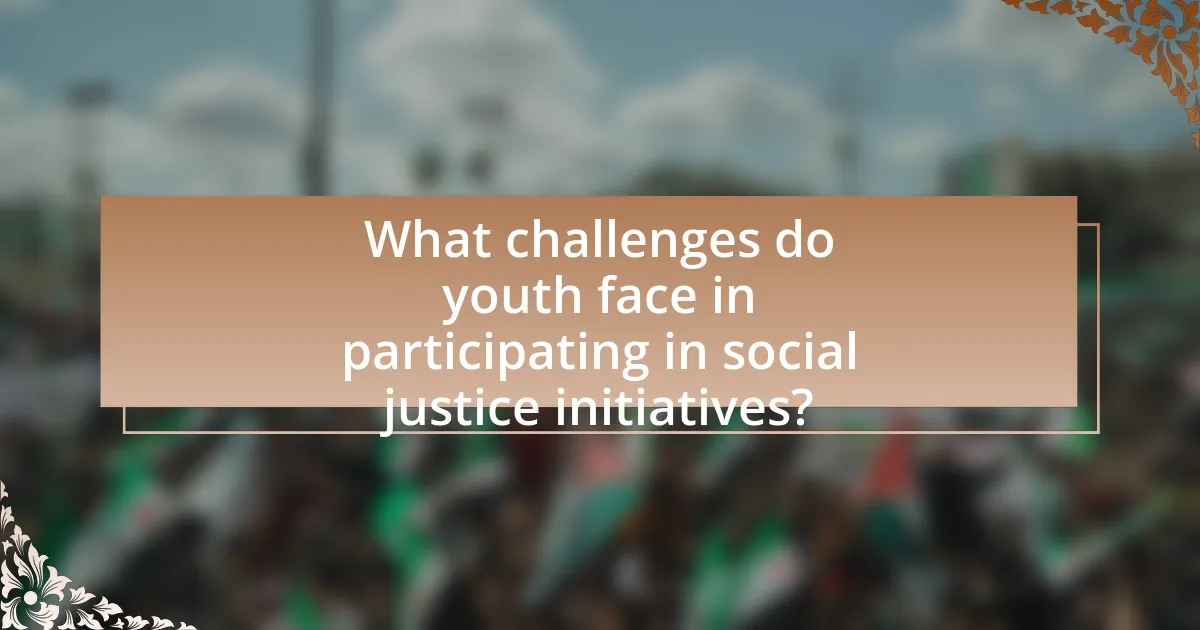
What challenges do youth face in participating in social justice initiatives?
Youth face several challenges in participating in social justice initiatives, including lack of resources, limited access to platforms for expression, and societal pushback. These challenges hinder their ability to engage effectively in advocacy and activism. For instance, many young individuals may lack financial support or transportation, which restricts their participation in events or campaigns. Additionally, youth often encounter barriers in the form of institutional resistance or negative perceptions from adults, which can discourage their involvement. Research indicates that 60% of young activists report feeling marginalized in discussions about social issues, highlighting the need for inclusive spaces that empower youth voices.
How can barriers to youth engagement be identified and addressed?
Barriers to youth engagement can be identified through surveys, focus groups, and interviews that assess their interests, motivations, and obstacles. For instance, research by the National Youth Leadership Council indicates that lack of access to resources, insufficient support from adults, and feelings of disconnection from the community are significant barriers. Addressing these barriers involves creating inclusive programs that provide mentorship, resources, and opportunities for meaningful participation. Evidence shows that initiatives that actively involve youth in decision-making processes lead to higher engagement levels, as demonstrated by the Youth Participatory Action Research model, which emphasizes youth voice and agency in social justice initiatives.
What role does socioeconomic status play in youth participation?
Socioeconomic status significantly influences youth participation in social justice initiatives. Youth from higher socioeconomic backgrounds often have greater access to resources, education, and networks that facilitate involvement in such activities. For instance, a study by the Pew Research Center found that youth from affluent families are more likely to engage in volunteer work and civic activities compared to their lower-income peers, who may face barriers such as lack of transportation, time constraints due to work obligations, or limited awareness of opportunities. This disparity highlights how socioeconomic factors can create unequal levels of engagement in social justice efforts among young people.
How can organizations create inclusive environments for all youth?
Organizations can create inclusive environments for all youth by implementing policies that promote diversity, equity, and accessibility. These policies should include training programs that educate staff and volunteers on cultural competency and anti-bias practices, ensuring that all youth feel respected and valued. Research indicates that inclusive environments lead to increased participation and engagement; for instance, a study by the National Youth Leadership Council found that youth from diverse backgrounds are more likely to participate in programs that actively promote inclusivity. Additionally, organizations should establish feedback mechanisms that allow youth to voice their experiences and suggestions, fostering a sense of ownership and belonging.
What are the potential impacts of youth-led social justice initiatives?
Youth-led social justice initiatives can significantly influence societal change by empowering young individuals to advocate for their rights and the rights of marginalized communities. These initiatives often lead to increased awareness of social issues, fostering a sense of agency among youth and encouraging civic engagement. For instance, the 2018 March for Our Lives movement, organized by students in response to gun violence, mobilized millions and resulted in legislative discussions on gun control, demonstrating the tangible impact of youth activism. Additionally, research from the Harvard Kennedy School indicates that youth-led movements can reshape public discourse and policy, highlighting the effectiveness of young leaders in driving social change.
How do youth-led initiatives differ from adult-led initiatives?
Youth-led initiatives differ from adult-led initiatives primarily in their leadership structure and decision-making processes. Youth-led initiatives empower young individuals to take charge, fostering creativity and innovation, while adult-led initiatives often rely on established authority and experience, which can limit the input of younger participants. Research indicates that youth-led initiatives tend to be more adaptable and responsive to the needs of their peers, as they are directly influenced by the perspectives and experiences of young people. For instance, a study by the International Youth Foundation found that youth-led projects are 30% more likely to engage their target demographic effectively compared to adult-led efforts, highlighting the importance of youth agency in social justice initiatives.
What success stories exemplify the impact of youth in social justice?
Youth-led movements have significantly impacted social justice, with notable success stories including the March for Our Lives campaign and the Fridays for Future climate strikes. The March for Our Lives, initiated by survivors of the 2018 Parkland shooting, mobilized over 800,000 participants in Washington, D.C., advocating for gun control and resulting in legislative changes in several states. Similarly, the Fridays for Future movement, started by Greta Thunberg, has inspired millions of students worldwide to strike for climate action, leading to increased awareness and policy discussions on climate change at global forums like the United Nations. These examples illustrate how youth activism can drive social change and influence public policy.
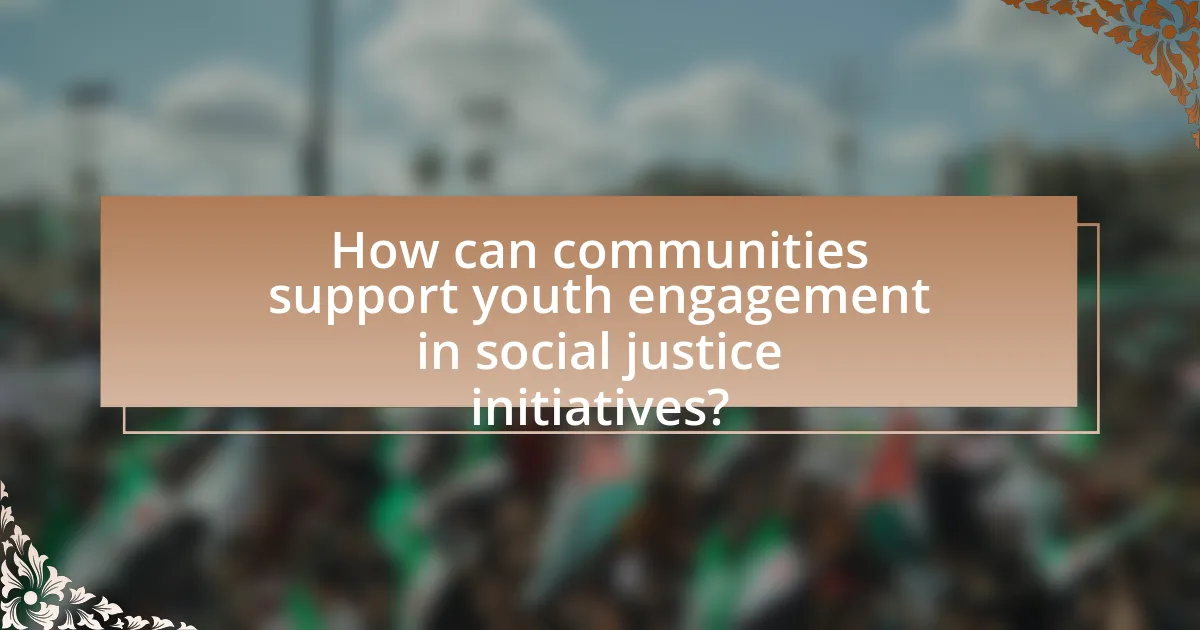
How can communities support youth engagement in social justice initiatives?
Communities can support youth engagement in social justice initiatives by providing resources, mentorship, and platforms for youth voices. Access to funding for projects, training programs, and workshops equips young individuals with the skills necessary to advocate effectively. For instance, organizations like the Youth Leadership Institute have demonstrated that mentorship programs significantly enhance youth participation in social justice efforts, leading to increased civic engagement and awareness. Additionally, creating safe spaces for dialogue and collaboration fosters an environment where youth can express their ideas and concerns, further promoting their involvement in social justice initiatives.
What resources are available for youth interested in social justice?
Youth interested in social justice can access various resources, including organizations, online platforms, and educational materials. Notable organizations such as the Youth Activism Project and the American Civil Liberties Union (ACLU) provide tools, training, and support for young activists. Online platforms like DoSomething.org offer campaigns and volunteer opportunities tailored for youth engagement in social issues. Additionally, educational resources, including books and documentaries on social justice topics, are available through libraries and online courses, enhancing understanding and activism skills. These resources collectively empower youth to engage effectively in social justice initiatives.
How can schools incorporate social justice into their curricula?
Schools can incorporate social justice into their curricula by integrating diverse perspectives and critical discussions on equity, power dynamics, and systemic injustices across subjects. This approach can include the use of literature that highlights marginalized voices, history lessons that address social movements, and projects that encourage students to engage with their communities on social issues. Research shows that curricula emphasizing social justice not only enhance students’ understanding of societal structures but also foster empathy and civic engagement, as evidenced by studies conducted by the National Education Association, which found that students exposed to social justice education demonstrate increased awareness and activism in their communities.
What role do local organizations play in fostering youth engagement?
Local organizations play a crucial role in fostering youth engagement by providing platforms for participation, resources for skill development, and opportunities for leadership. These organizations often create programs that encourage young people to get involved in community issues, thereby enhancing their civic awareness and responsibility. For instance, studies have shown that youth involved in local initiatives are more likely to develop a sense of belonging and commitment to their communities, which is essential for social justice movements. Additionally, local organizations often collaborate with schools and community leaders to ensure that youth voices are heard, thus empowering them to influence decisions that affect their lives.
What best practices can enhance youth involvement in social justice initiatives?
To enhance youth involvement in social justice initiatives, organizations should prioritize education and empowerment through workshops and training programs. These programs equip young individuals with the necessary skills and knowledge to understand social justice issues, fostering critical thinking and advocacy skills. Research indicates that youth who participate in structured educational programs are more likely to engage in activism and community service, as evidenced by a study published in the Journal of Youth and Adolescence, which found that 70% of participants reported increased civic engagement after attending such workshops. Additionally, creating platforms for youth voices, such as forums and social media campaigns, allows them to express their perspectives and influence decision-making processes, further solidifying their role in social justice efforts.
How can feedback from youth improve social justice programs?
Feedback from youth can significantly improve social justice programs by ensuring that these initiatives are relevant, effective, and resonate with the target demographic. Youth perspectives provide insights into the unique challenges and needs they face, which can inform program design and implementation. For instance, a study by the National Youth Leadership Council found that youth involvement in program development leads to higher engagement rates and more impactful outcomes. By incorporating youth feedback, social justice programs can adapt to changing societal dynamics and foster a sense of ownership among young participants, ultimately enhancing their effectiveness and sustainability.
What are effective ways to celebrate and recognize youth contributions?
Effective ways to celebrate and recognize youth contributions include organizing community events, providing awards or certificates, and showcasing their work through social media and local media outlets. Community events, such as youth-led forums or fairs, allow young individuals to present their initiatives and achievements, fostering a sense of pride and accomplishment. Awards or certificates can be given to acknowledge specific contributions, which not only boosts morale but also encourages continued engagement in social justice initiatives. Additionally, highlighting their efforts on social media platforms can amplify their voices and inspire others, as studies show that recognition in public forums increases youth motivation and participation in community activities.
What practical steps can youth take to get involved in social justice initiatives?
Youth can get involved in social justice initiatives by participating in community service projects, joining advocacy groups, and engaging in educational workshops. Community service projects allow youth to directly contribute to local needs, such as volunteering at shelters or organizing clean-up events, which fosters a sense of responsibility and awareness. Joining advocacy groups provides youth with a platform to voice their opinions and collaborate with like-minded individuals on issues such as racial equality, climate change, or gender rights. Educational workshops enhance their understanding of social justice issues, equipping them with the knowledge and skills necessary to effect change. According to a report by the National Youth Leadership Council, youth involvement in service learning increases civic engagement and promotes social responsibility, demonstrating the effectiveness of these practical steps.
